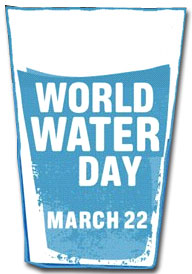World Water Day 2011
Tuesday is ‘World Water Day’, an occasion to celebrate water and its crucial contribution to human life in all its forms. To mark the occasion, the Organisation for Economic Co-operation and Development (OECD) has released a report that gathers available evidence on the benefits of investing in water and sanitation services.
The emphasis of the report is on presenting the facts and figures in a way that can grab the attention of policy-makers and investors.
So let’s start with the facts – almost 1 billion people lack access to safe water supplies, and 2,6 billion are without access to basic sanitation. Approximately 10% of the global burden of disease worldwide could be prevented with improvements to water, sanitation and hygiene and better water resource management.
Wastewater often reaches the environment untreated or insufficiently treated, resulting in major impacts on surface waters and associated ecosystems as well as economic activity that uses these resources.
Providing access to clean drinking water and sanitation can reduce health risks and can free up time for education and other productive activities, as well as increasing the productivity of the labour force.
In times of budget austerity – sanitation and hygiene promotion can be an extremely efficient allocation of public resources. An earlier study, produced by the Disease Control Priorities Project, a World Bank-funded NGO examining health priorities in the developing countries, found that hygiene and sanitation promotion cost respectively 3 dollars and 11 dollars per DALY averted (disability adjusted life year – a measure of overall disease burden), compared to 922 dollars per DALY for the provision of antiretroviral therapy against Aids for example).
Lahore – The World Water Day, 2011, with the theme “Water for Cities: Responding to the Urban Challenge” will be observed the world over, including in the country today (Tuesday) with an objective to focus international attention on the impact of rapid urban population growth, industrialisation and uncertainties caused by climate change, conflicts and natural disasters on urban water systems.
This year’s theme, “Water for Cities: Responding to the Urban Challenge”, aims to spotlight and encourage governments, organisations, communities, and individuals to actively engage in addressing the challenge of urban water management.
Different organisations and NGOs plan to hold a series of events to motivate the people to think about this precious gift from the Creator and play an effective role to save water for the next generations.
The COMSATS Institute of Information Technology, Lahore, and the Lahore College for Women University are also organising seminars in this connection.
The UN General Assembly (on December 22 1992) had adopted resolution A/RES/47/193 by which March 22 of each year was declared the World Day for Water. It was first time observed in 1993, in conformity with the recommendations of the United Nations Conference on Environment and Development (UNCED) contained in Chapter 18 (Fresh Water Resources) of Agenda 21.
As many as 72 million Pakistanis out of a 180-million population do not have access to safe drinking water as the country observes World Water Day today.
According to Environment Ministry sources, 72 million Pakistanis (44 per cent of the country’s population) are deprived of access to safe drinking water.
“This paucity of clean drinking water is more visible in rural areas where up to 90 percent inhabitants are deprived of their basic right. On the other side, only three percent of Pakistan’s sweet water resources are used for household purposes and drinking” – the Daily Times quoted sources, as saying.
While on one hand there is scarcity of water, on the other hand the available water is prone to various biological, chemical and physical contaminants, creating a dire need to purify and filter the available water in order to ensure protection from water born diseases and disorders.
The ever-increasing growth of the population in Pakistan has worsened the situation, and traces of multiple deadly rudiments (including human faeces) have been found in water by laboratory reports.
